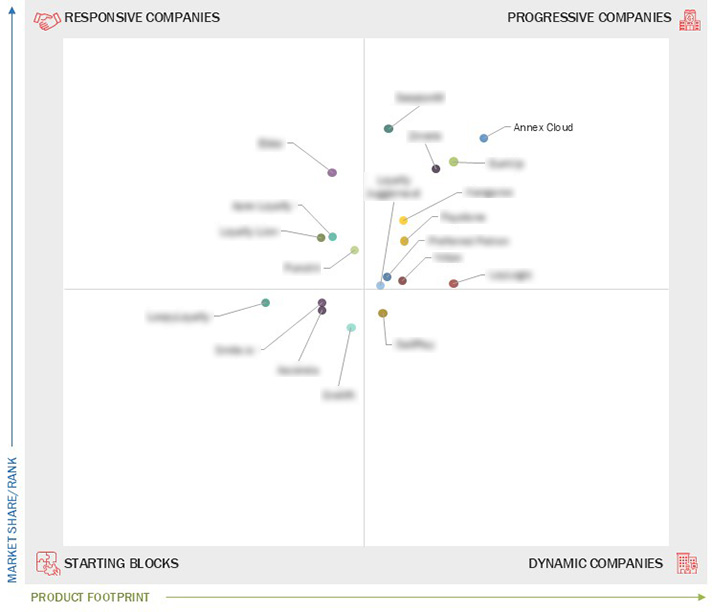Comparing 19 vendors in Loyalty Management Startups across 96 criteria.
Loyalty management focuses on enhancing customer engagement, retention, and satisfaction through strategic programs and digital tools. It plays a key role in strengthening brand relationships by offering personalized experiences across various touchpoints. With the rise of digital platforms, businesses are adopting omnichannel strategies and integrating technologies like AI and machine learning to better understand customer behavior. Loyalty programs have evolved from simple rewards to comprehensive systems that support long-term customer value. Effective loyalty management helps reduce churn and fosters deeper brand loyalty.
Market Leadership Quadrant
1.1 Objectives of the Study
1.2 Market Definition
1.3 Market Scope
1.3.1 Market Segmentation and Regions Covered
1.3.2 Inclusions and Exclusions
1.3.3 Years Considered
1.4 Currency Considered
1.5 Stakeholders
1.6 Summary of Changes
2.1 Introduction
2.2 Market Dynamics
2.2.1 Drivers
2.2.1.1 Growing focus on reducing customer churn rates
2.2.1.2 Integration of gamification into loyalty programs
2.2.1.3 Economic volatility drives loyalty investments
2.2.1.4 Emergence of loyalty management mobile applications
2.2.1.5 Demand for advanced solutions to monitor customer scores
and enhance customer engagement
2.2.1.6 Rising adoption of omnichannel customer loyalty strategy
2.2.2 Restraints
2.2.2.1 Fragmentation of customer data across various systems and
platforms
2.2.2.2 Stringent government regulations
2.2.3 Opportunities
2.2.3.1 Increasing investments in loyalty system technology
2.2.3.2 Surging investments in customer success startup platforms
2.2.3.3 Rising applications of big data and machine learning
2.2.4 Challenges
2.2.4.1 Exponential rise in marketing technology
2.2.4.2 Rapidly changing trends and diverse consumer preferences
2.2.4.3 Low awareness of loyalty program benefits
2.2.4.4 Data security and privacy issues
2.2.4.5 Unappealing rewards
2.3 Loyalty Management Market: Brief History
2.4 Supply Chain Analysis
2.5 Ecosystem
2.6 Porter’s Five Forces Model
2.6.1 Threat of New Entrants
2.6.2 Threat of Substitutes
2.6.3 Bargaining Power of Buyers
2.6.4 Bargaining Power of Suppliers
2.6.5 Intensity of Competitive Rivalry
2.7 Patent Analysis
2.7.1 Methodology
2.8 Disruptions Impacting Buyers/Clients in Loyalty Management Market
2.9 Technology Analysis
2.9.1 Key Technologies
2.9.1.1 Artificial intelligence and machine learning
2.9.1.2 Blockchain technology
2.9.1.3 Mobile wallets & apps
2.9.1.4 Customer data platforms
2.9.2 Complementary Technologies
2.9.2.1 Marketing automation
2.9.2.2 Customer relationship management
2.9.3 Adjacent Technologies
2.9.3.1 Sustainability IoT
2.9.3.2 Augmented reality & virtual reality
2.9.3.3 Biometrics
2.10 Key Conferences & Events
2.11 Technology Roadmap for Loyalty Management Market
2.11.1 Short-Term Roadmap (2025–2026)
2.11.2 Mid-Term Roadmap (2027–2028)
2.11.3 Long-Term Roadmap (2029–2030)
2.12 Best Practices in Loyalty Management Market
2.12.1 Meeting Customer Needs
2.12.2 Offering Choices
2.12.3 Defining Clear Goals
2.12.4 Utilizing Customer Data
2.13 Current and Emerging Business Models
2.14 Tools, Frameworks, and Techniques Used in Loyalty Management Market
2.15 Investment and Funding Scenario
2.16 Impact of AI/Generative AI on Loyalty Management Market
2.16.1 Use Cases of Generative AI in Loyalty Management
2.17 Impact of US Tariff – Loyalty Management Market
2.17.1 Introduction
2.17.2 Key Tariff Rates
2.17.3 Price Impact Analysis
2.17.4 Impact on Country/Region
2.17.4.1 US
2.17.4.2 Europe
2.17.4.3 Asia Pacific
2.17.5 Impact on Loyalty Management Market Segments
3.1 Overview
3.2 Key Player Strategies/Right to Win, 2022–2025
3.3 Market Share Analysis, 2024
3.3.1 Market Ranking Analysis
3.4 Revenue Analysis of Leading Players, 2021–2024
3.5 Brand/Product Comparison
3.6 Company Valuation and Financial Metrics
3.7 Company Evaluation Matrix: Startups/SMEs
3.7.1 Progressive Companies
3.7.2 Responsive Companies
3.7.3 Dynamic Companies
3.7.4 Starting Blocks
3.7.5 Competitive Benchmarking, 2024
3.7.5.1 Detailed list of key startups/SMEs
3.7.5.2 Company footprint: Startups/SMEs
3.7.5.3 Business model footprint: Startups/SMEs
3.7.5.4 Vertical footprint: Startups/SMEs
3.7.5.5 Region footprint: Startups/SMEs
3.8 Competitive Scenario
3.8.1 Product Launches
3.8.2 Deals
4.1 ANNEX CLOUD
4.1.1 Business overview
4.1.2 Products/Solutions/Services offered
4.1.3 Recent developments
4.2 APEX LOYALTY
4.2.1 Business overview
4.2.2 Products/Solutions/Services offered
4.2.3 Recent developments
4.3 SUMUP
4.3.1 Business overview
4.3.2 Products/Solutions/Services offered
4.3.3 Recent developments
4.4 KANGAROO
4.4.1 Business overview
4.4.2 Products/Solutions/Services offered
4.4.3 Recent developments
4.5 SMILE.IO
4.5.1 Business overview
4.5.2 Products/Solutions/Services offered
4.5.3 Recent developments
4.6 SESSIONM
4.6.1 Business overview
4.6.2 Products/Solutions/Services offered
4.6.3 Recent developments
4.7 LOYALTYLION
4.7.1 Business overview
4.7.2 Products/Solutions/Services offered
4.7.3 Recent developments
4.8 SAILPLAY
4.8.1 Business overview
4.8.2 Products/Solutions/Services offered
4.8.3 Recent developments
4.9 YOTPO
4.9.1 Business overview
4.9.2 Products/Solutions/Services offered
4.9.3 Recent developments
4.10 ZINRELO
4.10.1 Business overview
4.10.2 Products/Solutions/Services offered
4.10.3 Recent developments
4.11 PUNCHH
4.11.1 Business overview
4.11.2 Products/Solutions/Services offered
4.11.3 Recent developments
4.12 EBBO
4.12.1 Business overview
4.12.2 Products/Solutions/Services offered
4.12.3 Recent developments
4.13 PREFERRED PATRON
4.13.1 Business overview
4.13.2 Products/Solutions/Services offered
4.13.3 Recent developments
4.14 LOOPYLOYALTY
4.14.1 Business overview
4.14.2 Products/Solutions/Services offered
4.14.3 Recent developments
4.15 PAYSTONE
4.15.1 Business overview
4.15.2 Products/Solutions/Services offered
4.15.3 Recent developments
4.16 LOYLOGIC
4.16.1 Business overview
4.16.2 Products/Solutions/Services offered
4.16.3 Recent developments
4.17 ASCENDA
4.17.1 Business overview
4.17.2 Products/Solutions/Services offered
4.17.3 Recent developments
4.18 LOYALTY JUGGERNAUT
4.18.1 Business overview
4.18.2 Products/Solutions/Services offered
4.18.3 Recent developments
4.19 GRATIFII
4.19.1 Business overview
4.19.2 Products/Solutions/Services offered
4.19.3 Recent developments


 OneView Commerce, Inc.
OneView Commerce, Inc.
 Nov 2024
Nov 2024

